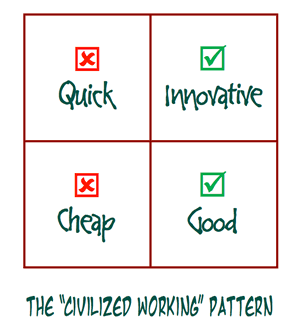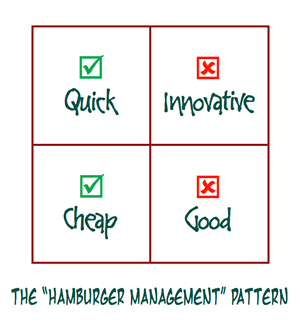Take Any Two From Four . . .
In a comment on a recent posting about slowness and quality, Gray Miller said:
I finally realized what was missing, so now I offer this revised version, using four elements:
 If you choose to provide a product or service that is both innovative and good, it will neither be quick nor cheap to produce. Innovation and quality take time: time to produce and refine the initial idea, time to make sure that all the bugs are ironed out before it goes on sale (famous software companies and auto makers take note!), and time to introduce and market it correctly. In addition, the people working on it need to come to work feeling in good shape, mentally and physically, or they cannot be as creative as you need them to be. Trying to rush things through, or cutting corners, will destroy the quality aspect. Being niggardly with resources will force people back onto old ideas, so there will be no creativity.
If you choose to provide a product or service that is both innovative and good, it will neither be quick nor cheap to produce. Innovation and quality take time: time to produce and refine the initial idea, time to make sure that all the bugs are ironed out before it goes on sale (famous software companies and auto makers take note!), and time to introduce and market it correctly. In addition, the people working on it need to come to work feeling in good shape, mentally and physically, or they cannot be as creative as you need them to be. Trying to rush things through, or cutting corners, will destroy the quality aspect. Being niggardly with resources will force people back onto old ideas, so there will be no creativity.
You want it cheap and still innovative? Then it won’t be good, mostly because it will be full of mistakes and bugs that should have been ironed out properly first—if people had not been forced to cut corners and bring it into use in too raw a state. In fact, it won’t be quick either, since you will be forced later to spend a great deal of unplanned time trying to correct the problems and errors built into the product or process by doing everything on the cheap. Innovation takes time to do properly. You may get the idea in a flash, but working it out into a practical system cannot be so easily rushed.
 The mantra of Hamburger Management—today’s favored kind of executive idiocy—is, of course, quick and cheap. That ensures what is produced cannot be innovative (No time to come up with new ideas, so everyone simply repeats all the old ones). Nor will it be good, since making sure that quality is built into the process demands thought (too slow and dangerous), care (also slows things down), investment (too expensive), good materials (eat into profits outrageously), good systems (ditto), and people who are not being driven to distraction by constant stress and pressure to cut costs and save time (Who do they think they are? Human beings like us?).
The mantra of Hamburger Management—today’s favored kind of executive idiocy—is, of course, quick and cheap. That ensures what is produced cannot be innovative (No time to come up with new ideas, so everyone simply repeats all the old ones). Nor will it be good, since making sure that quality is built into the process demands thought (too slow and dangerous), care (also slows things down), investment (too expensive), good materials (eat into profits outrageously), good systems (ditto), and people who are not being driven to distraction by constant stress and pressure to cut costs and save time (Who do they think they are? Human beings like us?).
There you have it. You can make whatever you do cheap, quick, innovative, or good, but you can only have two of the four at one time. Think about it. I’ll wager you will come up with lots of further examples of this “law” from your own experience. If you do, please share them here.


This reminds me of what I used to tell my clients when I was a freelance web designer: "There's Cheap, there's Fast, and there's Good. You get to pick any two."This struck me as a great thing to say. It’s simple, easy to remember, and quite profound in its implications for just about any kind of business. Still, it didn’t quite seem to cover everything that I thought about when I considered quality and its relationship to today’s epidemic of Hamburger Management.
I finally realized what was missing, so now I offer this revised version, using four elements:
- Quick;
- Cheap;
- Innovative; and
- Good.
 If you choose to provide a product or service that is both innovative and good, it will neither be quick nor cheap to produce. Innovation and quality take time: time to produce and refine the initial idea, time to make sure that all the bugs are ironed out before it goes on sale (famous software companies and auto makers take note!), and time to introduce and market it correctly. In addition, the people working on it need to come to work feeling in good shape, mentally and physically, or they cannot be as creative as you need them to be. Trying to rush things through, or cutting corners, will destroy the quality aspect. Being niggardly with resources will force people back onto old ideas, so there will be no creativity.
If you choose to provide a product or service that is both innovative and good, it will neither be quick nor cheap to produce. Innovation and quality take time: time to produce and refine the initial idea, time to make sure that all the bugs are ironed out before it goes on sale (famous software companies and auto makers take note!), and time to introduce and market it correctly. In addition, the people working on it need to come to work feeling in good shape, mentally and physically, or they cannot be as creative as you need them to be. Trying to rush things through, or cutting corners, will destroy the quality aspect. Being niggardly with resources will force people back onto old ideas, so there will be no creativity.You want it cheap and still innovative? Then it won’t be good, mostly because it will be full of mistakes and bugs that should have been ironed out properly first—if people had not been forced to cut corners and bring it into use in too raw a state. In fact, it won’t be quick either, since you will be forced later to spend a great deal of unplanned time trying to correct the problems and errors built into the product or process by doing everything on the cheap. Innovation takes time to do properly. You may get the idea in a flash, but working it out into a practical system cannot be so easily rushed.
 The mantra of Hamburger Management—today’s favored kind of executive idiocy—is, of course, quick and cheap. That ensures what is produced cannot be innovative (No time to come up with new ideas, so everyone simply repeats all the old ones). Nor will it be good, since making sure that quality is built into the process demands thought (too slow and dangerous), care (also slows things down), investment (too expensive), good materials (eat into profits outrageously), good systems (ditto), and people who are not being driven to distraction by constant stress and pressure to cut costs and save time (Who do they think they are? Human beings like us?).
The mantra of Hamburger Management—today’s favored kind of executive idiocy—is, of course, quick and cheap. That ensures what is produced cannot be innovative (No time to come up with new ideas, so everyone simply repeats all the old ones). Nor will it be good, since making sure that quality is built into the process demands thought (too slow and dangerous), care (also slows things down), investment (too expensive), good materials (eat into profits outrageously), good systems (ditto), and people who are not being driven to distraction by constant stress and pressure to cut costs and save time (Who do they think they are? Human beings like us?).There you have it. You can make whatever you do cheap, quick, innovative, or good, but you can only have two of the four at one time. Think about it. I’ll wager you will come up with lots of further examples of this “law” from your own experience. If you do, please share them here.







2 Comments:
My first thought when reading this was, that it is exactly right. But, since I had a bit of time this afternoon, I thought about it some more.
And that second thought, reveals that things are a bit more complex.
Toyota makes good quality cars, that are inexpensive, and sometimes innovative. Removing waste and putting the people who do the work in charge of improving their own processes makes a huge difference.
There are companies that make cars cheaper that Toyota, and other companies with better quality records, and yet other companies that are more innovative. And I don't know of anybody that makes cars faster than Toyota.
But Toyota is in the game on all four levels at once. This is because they have better management systems -- systems that harness the collective intelligence of their whole work force, not just their "knowledge workers."
Thanks for your comment, Mark.
I don't know a great deal about Toyota's manufacturing methods, other then they aim to save costs by eliminating waste.
What I think you may be pointing too is that companies can do better the others on all four dimensions because all dimensions are relative. A vehicle that is designed to be inexpensive may be good of its type and at its price. But it will never be as "good," in absolute quality terms, as an expensive, high-quality vehicle. It isn't designed to be.
What I was hoping to draw attention to is not elimating unnecessary costs, nor improving manufacturing methods in a sensible way, but cutting corners and doing things cheaply simply for the sake of being cheap and getting extra profits. I doubt if that is a good way to produce any kind of quality, relative or absolute.
Thanks again for your stimulating comment. Keep reading, my friend.
Post a Comment
<< Home